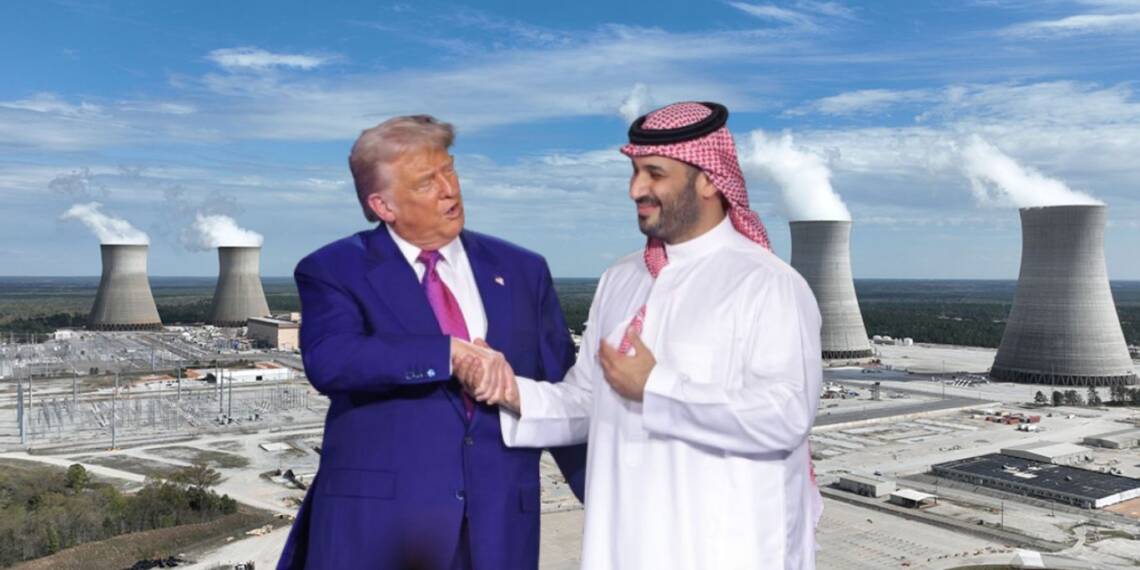Saudi Arabia is in advanced talks with the United States over a potential civil nuclear agreement — a move that could reshape both the region’s energy and geopolitical landscape. The talks come as Crown Prince Mohammed bin Salman pushes ahead with Vision 2030, his plan to diversify the Saudi economy and reduce its dependence on oil. But behind the promise of clean energy, the deal also raises tough questions about weapons proliferation, regional rivalry, and the future of US alliances.
A Push for Diversification and Energy Security
Despite being the world’s largest oil exporter, Saudi Arabia is looking to nuclear energy as a way to free up more crude oil for export, cut carbon emissions, and power energy-intensive processes like water desalination and air conditioning. Currently, around one-third of the kingdom’s electricity comes from burning oil and two-thirds comes from burning gas— a costly and inefficient method during peak summer months.
By turning to atomic energy, Riyadh aims to align with its Vision 2030 goals while boosting its economic strength. The strategy makes sense on paper, but its implementation has ignited international scrutiny.
Concerns Over Nuclear Weapons Ambitions
A major concern surrounding the nuclear talks is Saudi Arabia’s longstanding rivalry with Iran. In a 2018 interview, Crown Prince Mohammed bin Salman bluntly stated that if Iran developed a nuclear weapon, “we would follow suit as soon as possible.” Although Saudi officials now emphasize diplomacy with Iran, those earlier comments continue to cast a shadow over the kingdom’s nuclear intentions.
The potential for uranium enrichment within Saudi territory has further alarmed non-proliferation experts. Enrichment can be used to produce fuel for nuclear reactors — but also, if taken to high levels, to manufacture nuclear weapons. The Trump administration acknowledged Saudi Arabia’s interest in using its domestic uranium resources, though international experts have noted those reserves may be uneconomical to exploit.
Allowing enrichment technology on Saudi soil would mark a significant shift in longstanding US nuclear policy and could trigger a chain reaction of similar requests from other nations.
The US Perspective: Strategic and Economic Interests
For the United States, a civil nuclear deal with Saudi Arabia could bring both strategic and commercial benefits. American companies stand to win lucrative contracts to build nuclear plants, and the US would gain deeper insight into the kingdom’s atomic program. More broadly, it’s a chance to shape the program under non-proliferation safeguards.
Such agreements are governed by Section 123 of the US Atomic Energy Act, which sets strict conditions to prevent nuclear technology from being diverted for weapons use. Any final pact would also require Congressional review. The nuclear cooperation with Saudi Arabia can put the US rival, Russia, and the US away with Riyadh in energy cooperation, which would be a strategic gain in West Asia for the US.
Tied to Broader Regional Diplomacy
Under former President Joe Biden, nuclear cooperation was linked to a broader package of negotiations. These included potential US security guarantees for Saudi Arabia, new arms deals, and tangible progress toward Palestinian statehood. A major U.S. goal was to persuade Saudi Arabia to normalize ties with Israel as part of the Abraham Accords — a strategy that has since stalled, with Riyadh insisting that Palestinian rights must come first.
Although civil nuclear talks are now somewhat decoupled from the normalization track, the US still sees the deal as part of a larger diplomatic puzzle in West Asia.
Saudi Arabia Has Other Options
If talks with the US fail, Saudi Arabia has other suitors. China’s state-owned CNNC, Russia’s Rosatom, South Korea, and France have all expressed interest in supporting Riyadh’s nuclear ambitions. These countries may offer fewer restrictions, but choosing a non-U.S. partner could come with its geopolitical trade-offs.
Bottom Line
Saudi Arabia’s pursuit of a civil nuclear program is part of a calculated effort to diversify its economy and secure its energy future. But given the kingdom’s strategic location, regional tensions, and ambiguous past statements, the path forward is complex. Any agreement with the US will need to balance energy cooperation with rigorous safeguards and navigate a minefield of diplomacy, trust, and international law.








